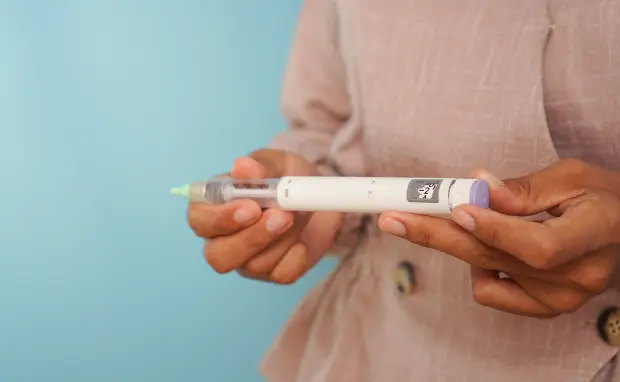Key Points
- Zepbound costs $1,086 monthly without insurance, but specific options can significantly reduce this price
- Eligible patients with commercial insurance can pay as little as $25 per month with a Zepbound savings card
- Medicare covers Zepbound only for obstructive sleep apnea, not weight management (although this may change as coverage is under review)
Zepbound has helped thousands of people achieve significant weight loss, but the price is steep at over a thousand dollars a month.
The good news is that the $1,086 price tag is not set in stone.
Between manufacturer savings programs, insurance coverage, and direct-purchase savings options, there are ways to bring the cost down.
What is Zepbound?
Zepbound (tirzepatide) is an FDA-approved prescription medication for chronic weight management in adults with obesity or overweight with at least one weight-related condition.
It was also approved by the FDA in December 2024 for treating moderate-to-severe obstructive sleep apnea in people with obesity.
“Zepbound is a once-weekly injection that activates two hormones that regulate your appetite and blood sugar,” explains Gia Eapen, MD. “It helps your body release more insulin after eating, produce less sugar, and feel fuller longer. This dual-action approach sets it apart from other GLP-1 medications like Wegovy.”
How much does Zepbound cost?
The cost of Zepbound varies based on whether you have insurance. Let's break down the pricing in different scenarios.
Zepbound cost without insurance
Without insurance, the Zepbound list price in 2025 is $1,086 for a one-month supply.
However, Eli Lilly (the manufacturer) offers single-dose vials (four-count package) at reduced prices. For example, the 2.5 mg starting dose is available at a reduced price of $349, and the 5 mg dose for $499 via LillyDirect.
This option can help reduce the cost burden if you do not have insurance.
Zepbound cost with insurance
Zepbound coverage varies widely across health insurance plans. Unlike medications for conditions like type 2 diabetes, weight loss drugs face greater coverage hurdles. Insurers have traditionally categorized them as lifestyle medications rather than medical necessities.
However, this is starting to change as more plans now recognize obesity as a legitimate medical condition.
Commercial insurance plans that cover the medication may require prior authorization and a healthcare provider to demonstrate a medical necessity before approval.
Zepbound cost with Zepbound savings card
If you have commercial insurance that covers Zepbound, you may qualify for the Zepbound Savings Card. This card reduces out-of-pocket expenses to as little as $25 for a 1-month or 3-month prescription of Zepbound.
Even if your commercial insurance does not cover Zepbound, you may be able to get Zepbound for around $650 per month with the Zepbound savings card.
Please note: Medicare and Medicaid beneficiaries are not eligible for this program.
Does Medicare cover Zepbound?
In 2025, Medicare plans may cover Zepbound when prescribed for obstructive sleep apnea in adults with obesity. Medicare may not pay for Zepbound for weight loss.
However, Medicare is considering covering Zepbound for weight loss in the future.
Medicaid coverage for Zepbound
Medicaid rules vary by state. Each state runs its own program with different formulas and approval criteria.
Many states limit coverage to certain medical conditions or exclude weight loss uses entirely. Others require documented evidence of prior weight loss attempts before approval.
Some state programs, like California's Medi-Cal, cover Zepbound without prior authorization. Please contact your state's Medicaid office to learn about coverage in your area.
How much weight can you lose on Zepbound?
Clinical trials show that people taking the 5 mg dose lost an average of 15% of their body weight over 18 months. For someone weighing 200 pounds, that's about 30 pounds.
Higher doses produced greater results: 19.5% weight loss at 10 mg and 20.9% at 15 mg.
It’s important to know that some people do not lose weight on Zepbound. Individual results vary on starting weight, medication adherence, diet, exercise habits, other underlying conditions, and more.
What is the best diet on Zepbound?
Rita Faycurry, RD, Registered Dietitian, says “The best diet would be to focus on nutrient-dense, small and frequent meals prioritizing protein and fiber. Ensure proper intake to maintain muscle mass and prevent nutrient deficiencies. Balancing carbohydrates is also important to keep blood sugars steady.”
Here are some recommendations on getting a nutritious diet:
- Focus on nutrient-dense foods: Since Zepbound reduces appetite, you may not feel hungry like you once did, but you still need adequate nutrition. Focus on high-volume, low-calorie foods.
- Include lean protein: Options include chicken breast, turkey breast, and legumes. This helps preserve muscle mass and keeps you satisfied longer.
- Add fiber: Vegetables, fruits, and whole grains are rich in dietary fiber, which helps you feel full longer.
- Choose healthy fats: Avocados, nuts, seeds, and olive oil provide healthy unsaturated fats and essential nutrients. However, try introducing fats slowly when you’re taking Zepbound, since very fatty meals can worsen nausea for some people.
- Stay hydrated: Adequate water intake helps manage common side effects like nausea and constipation, which some people experience on Zepbound. Also, if you’re increasing your fiber intake, you will need more water.
- Minimize non-nutritious foods: This includes ultra-processed foods, sugary snacks, and greasy or fried items. These can trigger digestive symptoms and provide empty calories.
- What about alcohol? It's not off-limits, but drinking can worsen side effects like nausea. Alcohol can also lower your inhibitions and lead to overeating, which may slow your progress. Talk to your doctor about what's right for you.
Partnering with a registered dietitian can help you eat nutritious foods at the right intervals to support weight loss and overall health goals on Zepbound.
Final thoughts
Zepbound is a step forward in treating obesity. Clinical trials show people lose 15%-21% of their body weight over a year and a half. However, pricing can be a barrier to access.
Zepbound costs vary widely by insurance. With commercial insurance, your out-of-pocket costs depend on your plan. Without insurance, it can cost over $1,000 a month.
Medicare and Medicaid don't currently cover it for weight loss, but may cover it for obstructive sleep apnea.
Zepbound manufacturer, Eli Lilly, offers savings programs that can lower costs for those with commercial insurance. Check your coverage and explore direct-to-consumer prices at LillyDirect.
For best results, use Zepbound along with a balanced diet, regular physical activity, and regular check-ins with your doctor. Sustainable weight loss requires more than medication alone.
Frequently asked questions (FAQs)
Is Zepbound better than Mounjaro?
Zepbound and Mounjaro are two brand names of the same active ingredient, tirzepatide. The main difference between the two is that Mounjaro is approved for type 2 diabetes, while Zepbound is approved for weight loss and moderate-to-severe obstructive sleep apnea.
Can you drink alcohol while on tirzepatide?
Gia Eapen, MD, says, “While tirzepatide and alcohol don't directly interact, combining them can undermine weight loss and worsen side effects like nausea. Alcohol adds empty calories and can lower inhibitions, leading to overeating. For people with diabetes, both substances affect blood sugar levels, which may create additional risks. Talk with your doctor about whether moderate drinking is safe for you.”
How much does Zepbound cost per month?
The list price is $1,086 for a month’s supply, but your actual expense may vary based on insurance. If you have commercial insurance that covers Zepbound and qualify for the Zepbound savings card, you may pay as little as $25 monthly.
If your insurance does not cover Zepbound, the savings card may reduce expenses to $650. If paying entirely out of pocket, vials ordered through LillyDirect may cost much less than full retail pricing. For example, the starting dose is available for as low as $349.
How to get Zepbound for less?
Start by checking your insurance coverage. If you have commercial insurance that covers Zepbound, apply for the Zepbound Savings Card to reduce your copay to $25 per month. Without insurance coverage, consider single-dose vials through LillyDirect for a lower cost. Work with your doctor to complete any required prior authorization and discuss financial concerns. They can help you access savings programs and find affordable options.
Boost weight loss on Zepbound with a personalized diet plan. Find a registered dietitian covered by insurance.
The views expressed by authors and contributors of such content are not endorsed or approved by Fay and are intended for informational purposes only. The content is reviewed by Fay only to confirm educational value and audience interest. You are encouraged to discuss any questions that you may have about your health with a healthcare provider.
Sources
- ZEPBOUND™ (tirzepatide) Injection, For Subcutaneous Use (2022)
https://www.accessdata.fda.gov/drugsatfda_docs/label/2025/217806s031lbl.pdf - FDA Approves First Medication for Obstructive Sleep Apnea (December 20th, 2024)
https://www.fda.gov/news-events/press-announcements/fda-approves-first-medication-obstructive-sleep-apnea - Lilly Pricing: How Much Should I Expect To Pay For Zepbound (Tirzepatide)?
https://pricinginfo.lilly.com/zepbound - Savings Card, Cost & Coverage Support | Zepbound® (tirzepatide)
https://zepbound.lilly.com/coverage-savings - Contract Year 2026 Policy and Technical Changes to the Medicare Advantage Program, Medicare Prescription Drug Benefit Program, Medicare Cost Plan Program, and Programs of All-Inclusive Care for the Elderly (CMS-4208-P) (November 26, 2024)
https://www.cms.gov/newsroom/fact-sheets/contract-year-2026-policy-and-technical-changes-medicare-advantage-program-medicare-prescription - ASPE: Medicare Coverage of Anti-Obesity Medications (November 26, 2024) https://aspe.hhs.gov/sites/default/files/documents/127bd5b3347b34be31ac5c6b5ed30e6a/medicare-coverage-anti-obesity-meds.pdf
- Tirzepatide Once Weekly for the Treatment of Obesity (June 04, 2022)
https://www.nejm.org/doi/full/10.1056/NEJMoa2206038











